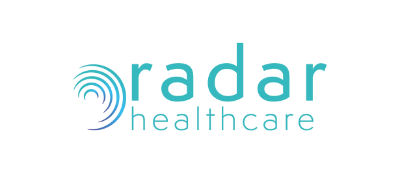Striving for Zero Harm Culture: A New Perspective on Patient Safety
11 June 2024
Tags:
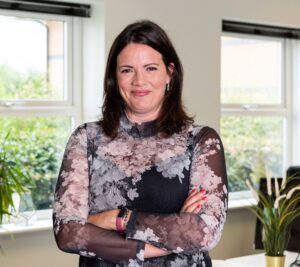 Digitisation and Zero Harm: Insights from Radar Healthcare’s Leadership Roundtable
Digitisation and Zero Harm: Insights from Radar Healthcare’s Leadership Roundtable
At Radar Healthcare, we are committed to fostering a zero harm culture in healthcare and social care settings. Recently, we hosted a roundtable discussion with C-Suite and Senior Leaders to explore the importance of digitisation in achieving this goal. Led by our Chief Partnerships Officer, Rhian Bulmer, the discussion included insights from CEO Paul Johnson, Account Director Ellie Jordan, and Strategic Sales Lead Molly Kent.
We believe this conversation is crucial for shaping the future of healthcare. To highlight its significance, consider these statistics from the World Health Organizations (WHO) 2024 Patient Safety report outlining why zero harm culture is so important:
“Unsafe care is a significant global public health issue, with more than one in ten patients experiencing harm in medical care settings – half of which could be preventable – leading to millions of deaths and substantial economic costs annually.”
“Globally, 1 in 20 patients suffer from preventable medication harm, highlighting a significant challenge across health care systems. Specifically, over half (53%) of this harm arises at the prescribing stage, pointing to a crucial need for improving medication safety practices.”
In this blog, we will summarise the key takeaways from the discussion, covering themes such as best practices and challenges, the importance of sentiment analysis and feedback, how to change the negative narrative, and more.
Meet our Roundtable Speakers
-
Rhian Bulmer
Chief Partnerships Officer at Radar Healthcare
-
Paul Johnson
CEO at Radar Healthcare
-
Ellie Jordan
Account Director at Radar Healthcare
-
Molly Kent
Strategic Sales Lead at Radar Healthcare
Celebrating What Goes Right
The group discussed the importance of celebrating successes to understand best practices and deliver excellent care. While addressing mistakes is crucial for improvement, there is often too much focus on what goes wrong and not enough on recognising even the smallest successes. Highlighting positive outcomes is equally important for growth and meeting regulatory standards.
The group acknowledged that this shift in culture takes time and effort. Understanding that positive outcomes are just as crucial for growth and meeting regulatory standards is essential.
One participant commented, “When looking at the science of why mistakes happen, it’s important to recognise that errors or adverse outcomes typically occur despite many previous instances where the same procedure went well. An incident doesn’t mean the process has always been flawed; it just means something went wrong this time.
Currently, systems tend to focus on the number of instances when things don’t go well, but this overlooks a vast dataset of successes. Capturing data on what goes right is essential to understand why things succeed, not just why they fail.”
Balancing Successes and Challenges in Healthcare with Radar Healthcare’s Events Module
At Radar Healthcare, our Events module aims to balance compliments, incidents, concerns, and successes. Recognising and valuing what goes right is vital for a comprehensive understanding and improvement of practices. Documenting and celebrating successes help create a detailed picture of healthcare practices, allowing you to identify patterns of excellence and replicate them.
By asking, ‘What’s going right, and how can you ensure it continues?’, you promote a culture that learns from success as well as failure. Celebrating excellence boosts morale and strengthens your commitment to a zero harm culture, ensuring every team member understands their role in maintaining and improving care standards.
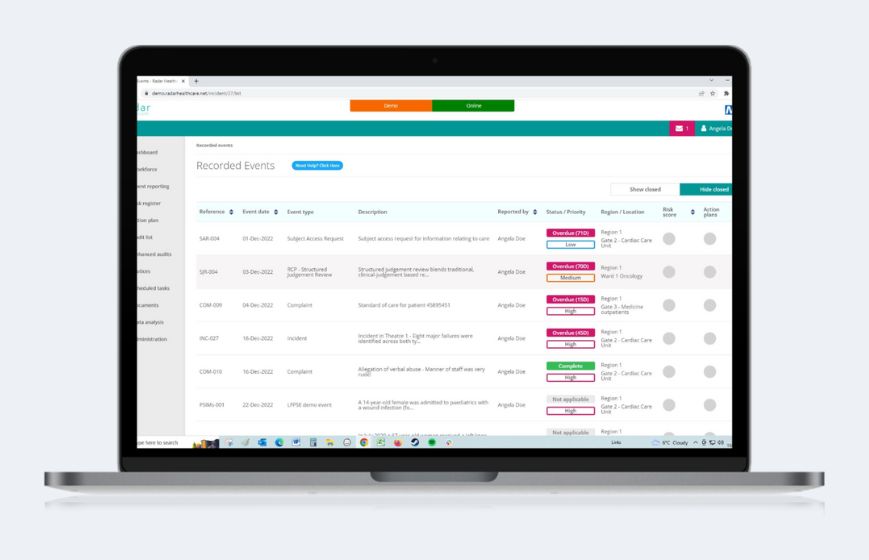
Changing “Near Misses” to “Good Catches”
In health and social care, the language we use shapes our perception and behaviour. Changing ‘near misses’ to ‘good catches’ fosters a more encouraging, blame-free environment. This shift positively affects how team members perceive and engage with incident reporting. By calling them ‘good catches,’ you can emphasise the proactive steps taken to prevent harm, celebrating the vigilance and quick thinking of care teams. This recognition highlights crucial interventions that, while not headline-grabbing, are vital for patient safety. Encouraging the documentation of these events as positive actions helps create a culture where staff feel supported and valued.
The group discussed the potential stigma associated with incident reporting, noting that fear of blame can hinder reporting.
One participant remarked, “A lot of services are still paper based, so the expectation is for someone to fill out a paper record, hand it off, and hope it gets entered into an electronic system. This issue is compounded by a culture of blame that discourages reporting.”
We know that near misses occur more frequently than incidents—so, what can you learn from them? How can you better record and capture these events to enhance our understanding and improve our practices?
Another participant stated, “This is a significant cultural shift, and organisations must ask themselves tough questions: Are you equipped to report effectively, or are you doing it as a mere exercise? It’s crucial to focus on making reporting valuable and having the capacity to do it well, from recording and investigating to measuring, acting on feedback, and embedding improvements.”
The group agreed that systemising these processes is essential to save time and improve the effectiveness of reporting.
The Power of Sentiment Analysis
Harnessing sentiment analysis in health and social care isn’t just about collecting feedback; it’s about deeply understanding the emotional undertones behind the words of both patients and staff. The group concluded that although everyone knows that collecting feedback is important, some organisations are still not fully understanding the importance of patient advocacy and bringing a range of stakeholders into conversations sooner.
By designing feedback mechanisms that are easy to use and positioned at relevant touchpoints and actively listening, you empower individuals to share their experiences and insights without barriers. But it’s not just about gathering this data; it’s about asking the right questions at the right moments to ensure the feedback we receive is genuinely useful. This enables you to discern patterns, identify areas for improvement, and tailor your approaches to meet the nuanced needs of your healthcare communities.
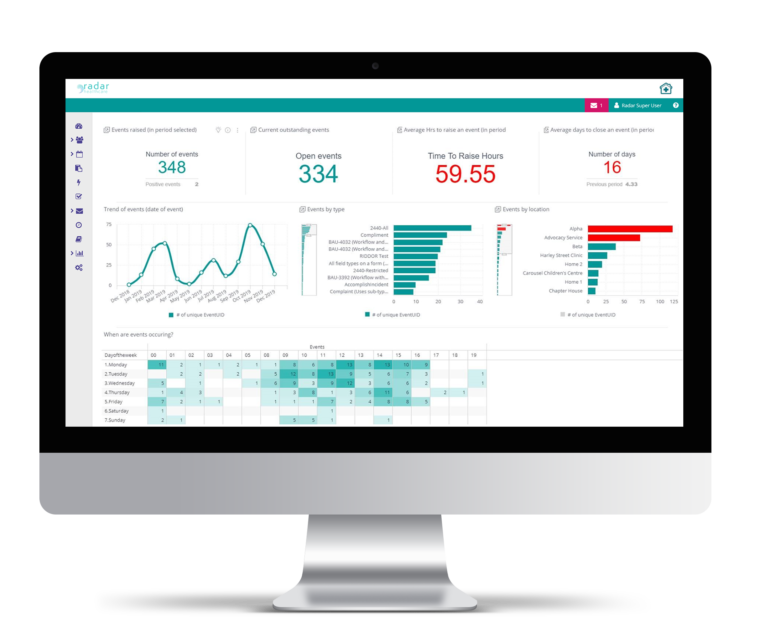
The group discussed this at length, and one participant articulated: “I was thinking about how we use data and insights, particularly how we can triangulate staff sentiment data with other data sources. By using this data predictively and preventatively, we can identify services under strain before incidents occur. This approach allows us to implement resilient interventions proactively rather than reacting after problems arise. It’s about working on the front foot rather than reactively on the back foot.”
Another member highlighted the importance of analysing all data: “Listening and acting on feedback is crucial, and organisations are already doing this, but it’s often too easy to ignore if it’s not negative. We tend to focus on complaints or extremes, either rewarding brilliance or investigating failures, missing the richness of feedback that highlights positive practices we can build upon. There’s a lot of valuable data in the middle ground that we need to pay attention to.”
But again, questions such as “how do you commit to collecting feedback and sentiment analysis well in a disparate and hyper-stressed environment?” and “how do you ensure that the feedback that you are being given is truthful to how the person feels?” arose.
Collecting Honest and Relevant Feedback
Creating a culture of open communication where employees and stakeholders feel safe to provide honest feedback is essential for organisational growth and improvement. The roundtable discussion explored best practices for collecting timely, honest, and relevant feedback while emphasising the importance of fostering an environment free from blame culture or backlash.
One participant shared: “We strive to log all concerns raised by patients and staff, even if they’re not formal complaints. Our process is to follow up with letters, informing patients about the formal complaint process, but also addressing their immediate concerns. By dealing with issues promptly, we prevent them from escalating. While we must focus on negatives due to policy and accountability, it’s crucial to address minor issues early. Using Radar Healthcare for concerns and complaints has significantly reduced the time to resolve them, showing real improvements in our handling process.”
For these initiatives to work, it is imperative that you consider whether the people giving the feedback feel safe giving their honest opinions.
Another member added: “We’ve initiated a program to empower staff to raise concerns safely, introducing a safety code for escalating issues if necessary. We’re relaunching this program, especially due to recent events, to ensure all staff and consultants understand its power and the importance of speaking up when things aren’t right. By fostering an environment where concerns can be raised early, we aim to address sentiments and prevent incidents. It’s about realising that events are often the result of multiple factors and encouraging open discussions to promote learning and improvement.”
Off the back of this conversation, another member of the group said: “We’re striving to engage staff more actively in incident discussions. We’re working to embed this practice at the local hospital level, ensuring staff have a platform to discuss incidents as they occur. It requires a cultural shift in how we manage incidents, but we’re seeing positive signs of progress. Implementing these changes fosters a more open and just culture, reducing the tendency to blame individuals for incidents and promoting improvement.”
Utilising Radar Healthcare to Collect Feedback and Best Practices
Systems like Radar Healthcare aim to prioritise organisation learning through a number of methods, including collection of feedback and analysis of this data. For instance, Radar Healthcare allows you to embed feedback surveys into the system and create sentiment analysis dashboards to consolidate data in one central location for better oversight.
Paul Jonhson, CEO of Radar Healthcare, expands: “Since we’ve started delving into sentiment analysis and integrating it into our analytics, we’ve observed two key themes. Firstly, there’s the sentiment at an employee level, which reflects how they perceive the organisation. Often, employees may attribute blame to the organisation for their circumstances. Secondly, there’s sentiment at a task-specific level, where individuals express extreme frustration or dissatisfaction with particular processes or tasks. This dual perspective provides valuable insights into both organisational perceptions and specific pain points within tasks or processes.”
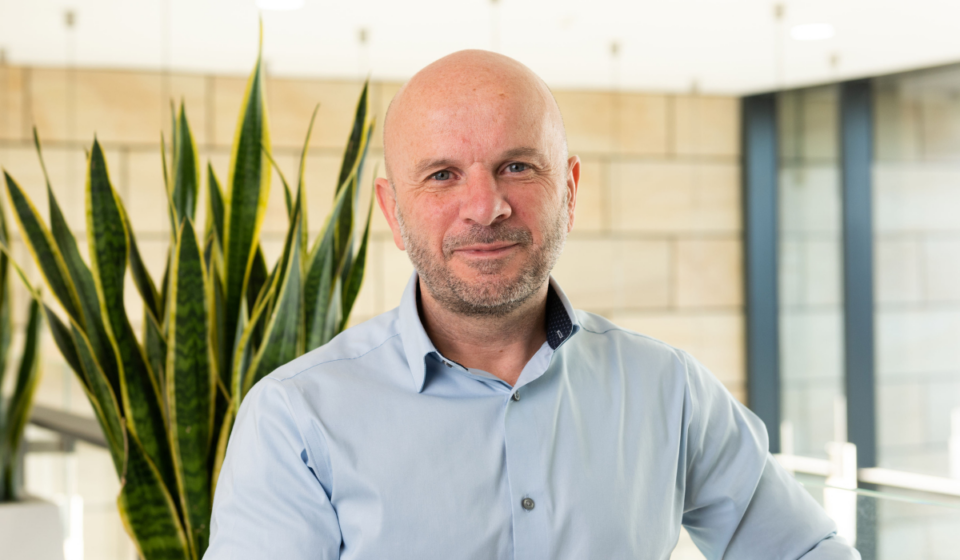
Molly Kent, Strategical Sales Lead at Radar Healthcare, highlighted the importance of alternative ways of capturing feedback to improve accuracy of the data, “Using alternative methods like QR codes for capturing feedback and sentiment analysis, rather than relying on system logins or paper-based methods, can improve reporting. If people don’t feel safe or believe their reports are anonymous, they might be apprehensive due to fear of backlash. Moreover, it is key to adapt the way in which you collect data based on the person and their preference. For example, you wouldn’t give a person who couldn’t use an iPad an iPad. It is important to consider barriers and make the process as seamless, relevant, and timely as it can be.
Molly continues: “That mixture of qualitative and quantitative is so potent when it’s together. So, the question is, how do we integrate that data with our core data sets as an organisation? By using an intuitive system, like Radar Healthcare, you can have all this rich information in one location and create a custom dashboard to reflect those findings.”

Learning from Excellence
Embracing the moments of excellence and ‘good catches’ shines a light on the proactive efforts that contribute to patient safety and well-being. In the complex world of healthcare, where the focus often gravitates towards rectifying errors, the roundtable discussion unanimously acknowledged the importance of highlighting positive achievements. It’s not merely about avoiding harm; it’s about actively creating a safer environment through diligence and foresight. These moments, though sometimes small, are powerful examples of how alertness and quick action can avert potential issues before they arise.
One participant echoed: “There was a shift a few years ago to focus on ‘always events’ rather than just ‘never events.’ This psychological shift emphasises best practices for patient experience and outcomes. Organisations need to commit to consistently implementing these practices. While we are conditioned to analyse failures, we often overlook the importance of learning from successes. There’s immense value in capturing and sharing positive learnings to foster continuous improvement.”
The conversation continued: “Organisations tend to focus on learning only when things go wrong, but there’s a lot to learn from what goes right. Culturally, we need to shift the conversation to understand and prioritise our successes, instead of always focusing on the negative. There’s a richness of information that is often missed, and internal conversations can help uncover and utilise this valuable insight.”
By celebrating these successes, we underline the significance of vigilance and the critical role it plays in our collective pursuit of a zero harm culture. This mindset shift encourages all members of the healthcare team to not only report incidents but also to recognise and share instances of exemplary practice and near misses that were adeptly handled. It’s this positive reinforcement that cultivates a supportive atmosphere, where learning from what goes right is as valued as learning from what doesn’t.
Paul Johnson, CEO of Radar Healthcare recounted how one of Radar Healthcare’s partners are strategically using Radar Healthcare to become a high reliability organisation:
“We’re seeing best practices working well with an international customer, the Emirates Health Service, which operates 90 locations including health centers and hospitals. They’ve deployed a platform with analytics to measure specific outcomes, defining best practices through hard KPIs at each location. When improvements are detected, a data-driven event in Radar Healthcare triggers a best practice review. This process, combined with cultural recognition through awards, ensures that effective practices are shared and adopted across all locations. This approach exemplifies a high reliability organisation, where a formal commitment to constant monitoring and improvement drives down adverse metrics effectively.”
Summary
In drawing our roundtable discussion to a close, it’s clear that the journey towards a zero harm culture in health and social care is both complex and rewarding.
It’s evident from this discussion that there’s no one-size-fits-all approach. Organizations differ in their strategies, aligning with their individual stages of progress. Yet, it’s compelling to explore the diverse viewpoints shared here, each representing a unique journey of every organisation.
At Radar Healthcare, we remain committed to championing this cause, propelled by our collective insights and the unwavering dedication of healthcare professionals. We understand that fostering a culture of openness, celebrating every good catch, and embracing the power of real-time feedback are pivotal steps in this journey.
Together, let’s continue to drive positive change, ensuring that our healthcare community not only navigates the challenges ahead but thrives in doing so.
